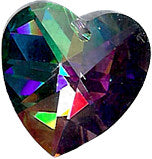The History of Swarovski Crystal
Chances are the name Swarovski conjures images of dazzling, brightly-hued stones in your mind’s eye. For nearly 70 years, the Swarovski name has been synonymous with sparkling jewels, but the real story begins long before that.

In the late 19th century, Daniel Swarovski worked in his father’s glass cutting factory in Wittens, Austria. Fascinated by the trade, Daniel practiced his skill with verve and acuity, and by age 30 had invented his own glass-cutting machine. Prior to his newfangled invention, skilled craftsmen had done glass cutting by hand, but the manual labor factor meant that each stone was slightly different than the last. With the creation of Swarovski’s contraption, crystal stones were now turned out swiftly and uniformly, which would eventually revolutionize the glass jewelry industry.

Although the decades saw Swarovski crystals used in everything from traffic signals to binoculars, it wasn’t until the 1920s that the fashion world took notice of the gleaming gems and houses like Chanel and Schiaparelli snapped up fabric sewn with the scintillating crystal beads. By the 1950s, Swarovski had teamed with Christian Dior to develop the highly reflective, glistening coating that defines the Swarovski crystals we know today.
Since the mid 20th century, Swarovski has emerged as the frontrunner in crystal beads. The company is known for its constant innovation and creation of new colors, coatings, and designs. Swarovski crystals beads make stunning necklaces, bracelets, earrings, and anklets. In fact, no matter how you choose to wear your Swarovski crystal beads, the beauty imbued by the 118-year history will shine spectacularly through.
Sources:

